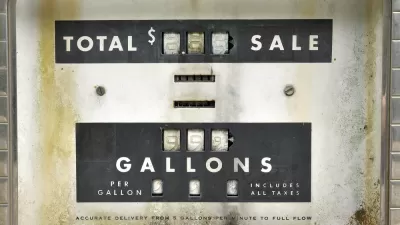Rather than supporting an increase in gas taxes and vehicle registration fees like many states are doing to fund transportation spending, Gov. Chris Christie asks the legislature to find funds by making cuts within the general fund.

"With the state Transportation Trust Fund (TTF) nearly out of cash and few signs of progress in the Legislature, Gov. Chris Christie said on Wednesday that he was loath to back an increase in the state’s gasoline tax and said lawmakers should seriously consider developing a plan built around general-fund spending," writes Ryan Hutchins, POLITICO's New Jersey bureau chief.
"...Make choices inside the general fund. There’s places to cut.”, the Republican governor said at an unrelated news conference in Trenton.
Christie went on to declare the Transportation Trust Fund, in existence since 1985, to be "obsolete," ironically because the tax hasn't been raised since 1988. However, that argument has also been applied to the Highway Trust Fund as the 18.4 cent gas tax hasn't been raised since 1993. Like Christie, President Barack Obama has opposed increasing the gas tax increase in his two terms but has looked to the general fund for subsidies, though he proposed an oil fee to fund transportation spending last February.
Christie's position is a dramatic turnaround from September 2014 when he insisted that "all options were on the table," including gas tax hikes, as reported in a transportation analysis by Mark J. Magyar in N.J. Spotlight:
When a reporter at the governor’s press conference did not believe that Christie was actually considering a tax increase, the governor was adamant that he was open to all solutions: "Is there something about 'Everything's on the table' that's confusing to you?" he demanded.
"The Garden State's 14.5-cent gas tax (10.5 cent excise tax plus 4.0 cpg Petroleum Products Gross Receipts Tax) is the second lowest in the United States after Alaska," notes a post in April about a proposal to reduce the estate tax as a tradeoff for hiking the gas tax.
Finding funding from the general fund, "at least in the short term — would likely require enormous spending reductions to produce anywhere near the level of resources the state has grown accustomed to since the infrastructure trust was created more than two decades ago," adds Hutchins.
The TTF currently spends $1.6 billion per year in state revenues on road, bridge and transit projects, supported in part by the state’s gas tax. But the fund’s debt has grown to such extraordinary levels that the fuel taxes can no longer sustain new spending or bond offerings....The current trust fund will be out of cash by early August, state officials have said.
Why the turnaround?
With the state's economy doing better, Christie figures there's no reason to raise user fees, but the General Fund is fair game for cutting to increase transportation funding.
And he's backing a proposal by a proposal offered by state Sen. Jennifer Beck (R-Red Bank), premised on an uncertain "3 percent annual hike in state’s revenues," according to the NJ Spotlight, that "has called for consolidating transportation agencies, implementing cuts to public worker health benefits and tapping revenues from various sources to produce enough money for a new, $1.6 billion trust fund — all with no tax increase," writes Hutchins.
Hat tip to Martine Powers of POLITICO Morning Transportation newsletter.
FULL STORY: Christie: Concept of Transportation Trust Fund is 'obsolete'

Manufactured Crisis: Losing the Nation’s Largest Source of Unsubsidized Affordable Housing
Manufactured housing communities have long been an affordable housing option for millions of people living in the U.S., but that affordability is disappearing rapidly. How did we get here?

Americans May Be Stuck — But Why?
Americans are moving a lot less than they once did, and that is a problem. While Yoni Applebaum, in his highly-publicized article Stuck, gets the reasons badly wrong, it's still important to ask: why are we moving so much less than before?

Research Shows More Roads = More Driving
A national study shows, once again, that increasing road supply induces additional vehicle travel, particularly over the long run.

Judge Halts Enforcement of Anti-Homeless Laws in Grants Pass
The Oregon city will be barred from enforcing two ordinances that prosecute unhoused residents until it increases capacity and accessibility at designated camping sites.

Advancing Sustainability in Los Angeles County Schools
The Los Angeles County Office of Education’s Green Schools Symposium brings together educators, students, and experts to advance sustainability in schools through innovative design, climate resilience strategies, and collaborative learning.

Using Old Oil and Gas Wells for Green Energy Storage
Penn State researchers have found that repurposing abandoned oil and gas wells for geothermal-assisted compressed-air energy storage can boost efficiency, reduce environmental risks, and support clean energy and job transitions.
Urban Design for Planners 1: Software Tools
This six-course series explores essential urban design concepts using open source software and equips planners with the tools they need to participate fully in the urban design process.
Planning for Universal Design
Learn the tools for implementing Universal Design in planning regulations.
City of Moreno Valley
Institute for Housing and Urban Development Studies (IHS)
City of Grandview
Harvard GSD Executive Education
NYU Wagner Graduate School of Public Service
City of Cambridge, Maryland
Newport County Development Council: Connect Greater Newport




























